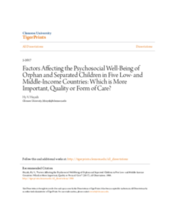ABSTRACT
This study employed a correlational design and examined the extent to which four components of quality of care (including food security, quality of shelter, quality of caregiving, and access to health care services) predicted psychosocial well-being of orphaned and separated children (OSC), as well as the extent to which these components of quality of care and key demographic factors, such as age, gender, and orphan status moderated the associations between care settings and psychosocial well-being of OSC. This study was an extension of Whetten et al.’s 2009 study that found psychosocial wellbeing was no worse for institution- than community-based OSC and, after adjusting for sites, age, and gender, institution- vs. community-based care setting explained only 0.3- 7% of the variability in child outcomes. This study drew from the latest data from the ongoing Positive Outcomes for Orphans (POFO) Study and used a sample population of 2,013 (923 institution- and 1,090 community-based) OSC among six diverse study sites across five low and middle income countries (LMICs): Cambodia, India (Hyderabad and Nagaland), Kenya, Tanzania, and Ethiopia. A series of hierarchical linear and moderated multiple regression analyses revealed that all four components of quality of care significantly predicted child psychosocial well-being. Moreover, three of the four components of quality of care (food security, quality of caregiving, and access to health care services) and two of the three key demographic factors (gender and orphan status) significantly moderated the associations between care settings and child psychosocial well-being. Practical and policy implications and future research are discussed.

